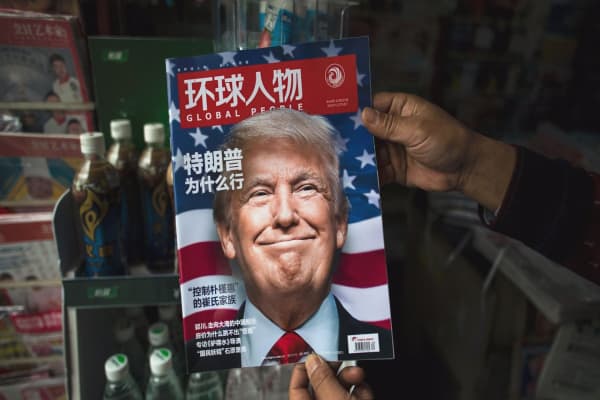US-China war increasingly a 'reality,' Chinese army official says
China is preparing for a potential military clash with the United States, according to an article on the Chinese army's website.
"The possibility of war increases" as tensions around North Korea and the South China Sea heat up, Liu Guoshun, a member of the national defense mobilization unit of China's Central Military Commission, wrote on Jan. 20—the same day as President Donald Trump's inauguration.
"'A war within the president's term', 'war breaking out tonight' are not just slogans, but the reality," Liu said in the Chinese commentary piece.
The commentary was first reported by South China Morning Post on Friday, and comes amid concerns about a trade war between the world's two largest economies.
The White House did not immediately reply to a request for comment from CNBC.
Ian Bremmer, president and founder of global political risk consultancy, Eurasia Group, said the article from the People's Liberation Army was more a warning rather than a show of strength.
"The Chinese government is quite concerned about the potential for direct confrontation with the Trump administration," Bremmer said in an email to CNBC.
Previously, Beijing was more cautious in reacting to Trump's anti-China rhetoric, Bremmer said, but now, "Chinese officials are preparing for the worst, and they expect to retaliate decisively in response to any U.S. policies they perceive as against their interests."
In just over a week in office, President Donald Trump's administration has shifted the U.S. tone from one of caution to more aggressive pushback against China's assertive territorial claims in the South China Sea.
Trump said the Monday after his inauguration that the U.S. would prevent China from taking territory in international waters in the region.
"The U.S. is going to make sure that we protect our interests there," White House spokesman Sean Spicer said, speaking in response to a question on whether Trump agreed with comments from his Secretary of State pick Rex Tillerson. The former CEO of Exxon Mobil, that China should not be allowed access to islands it has built in the South China Sea.
China has installed weapons and built military-length air strips in the contested region. Meanwhile, Beijing-backed media have said the U.S. would need to "wage war" to stop Chinese access.
The U.S. needs China's cooperation to keep North Korea's nuclear threats in check. But challenges to the U.S.'s "One China policy" that does not officially recognize Taiwan's independence — a red-line issue for Beijing — could also add to tensions.
"China doesn't want trouble with the U.S., especially not in the run up to their own leadership transition this fall," Bremmer said. "But if it comes, they want President Trump to understand the consequences."
In addition to more militaristic talk, Beijing has also stepped up its promotion of the Chinese economic system as an alternative to what it calls the "crisis" of Western Democracy and capitalism.
"Western-style democracy has played a progressive role in history, but right now it has heavy drawbacks," Han Zhen, Communist Party secretary of the Beijing Foreign Studies University, wrote in a Chinese editorial in the People's Daily last weekend.


No comments:
Post a Comment
Comments always welcome!